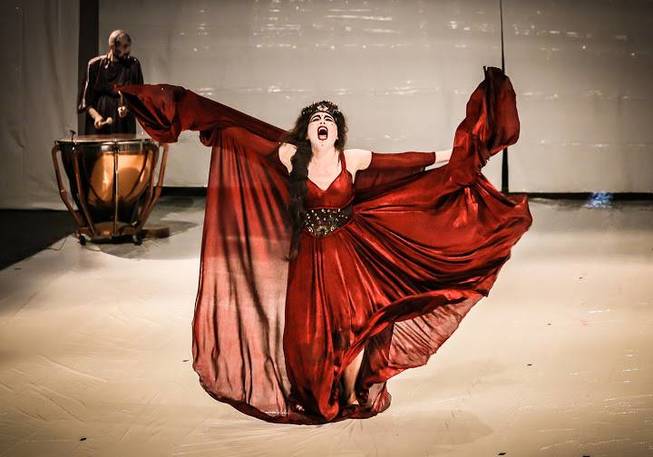


I believe in the magic of theater... as an audience member you walk into that room to be part of that electric energy between audience and performer.
And magic is what’s happening at La MaMa E.T.C. with Teatro Patologico (Pathological Theater) from Rome in "MEDEA," adapted from Euripides and directed by Dario D'Ambrosi. Until October 18, at the Ellen Stewart Theater of La MaMa E.T.C., audiences can experience a revisitation of the Greek tragedy where professional actors, coming from both the US and Italy, perform, in English, with a chorus of 14 non professional actors, performing in Attic Greek, with various mental disabilities.
“When I started making theater decades and decades ago,” D’Ambrosi, the creator of Teatro Patologico and one of Italy's most accomplished theater artists, told us, “I thought that theater was boring. It was always the same reheated soup... the same thing repeated over and over, night after night. I wanted to do something different, something that would turn into a unique experience for everyone participating, both performers and audience.”
“Tonight when you walk into the theater you as an audience are expecting to see a play, but the truth is that what you are about to see is anything but a 'normal' show,’ D’Ambrosi continued. “Yes, we have costumes, lights, a set, props and all the ingredients for a theater representation but the actors, with the exception of the few professionals, are nothing like regular people. Some have schizophrenia, others are manic-depressive or are affected by autism or Down Syndrome. Before this experience, some of them weren’t able to talk or they have never cried, others have been harming themselves for years. Through our theater program they have learned to act, move, become part of a choreography and achieve a structured movement pattern. Their progress gives me the strength and the enthusiasm to push forward.”
D’Ambrosi, an actor himself, has been working for decades with people with psychiatric disabilities, devising productions with their participation. He founded the First University of the Integrated Theatre of Emotion, a college program at his "La magia del teatro" (The magic of Theatre) drama academy, which offers a three-year college diploma in the performing arts to those with diagnoses of mental disorders.
“Working with actors with mental disabilities brings us to a new form of theatrical language,” D’Ambrosi continued to explain, “of which they hold the key. Their presence on stage is intentionally 'anti-theatrical.' Anything can happen: they could leave the set at any moment or end the show before its conclusion.” At La Mama, during a performance nothing major happened, but there were a few minor, spontaneous reactions that made the staging even more unique. “Each night is be an absolute surprise both for my 'patient-actors' and for the audience.”
Medea's cast features professional actress Celeste Moratti as the title character, Duane Allen as Creon, Mauro F. Cardinali as Jason, and Michela D’Ambrosi as Glauke. The chorus features Beatrice Agostini, Emanuele Antei, Emanuela Daniele, Fabio De Persio, Andrea Ferrari, Gilberto Giliberti, Paolo Gilberti, Elisa Maruca, Claudio Salvatore, Valerio Serafino, Claudia Terracini, Daniela Tortosa, Paolo Vaselli and Giuliano Verdecchia. On stage with them Papaceccio and Francesco Santalucia playing their original music and leading the chorus.
D'Ambrosi's adaptation of Medea was originally presented as a work in progress by La MaMa E.T.C. in December, 2011 for four performances as part of "Teatro Patologico in New York," a festival of Pathological Theater and Film honoring La MaMa's 50th Anniversary. In 2012, a full production was presented at Wilton's Music Hall in London and won the Wilton Prize 2012/13 as the best show of the season.
Prior to this run, the production was staged, in September, at Teatro Argentina in Rome. Performances will be held until October 18 and there are two special events coming up: on the 15th, a celebration for D'Ambrosi's 35 years of collaboration with La MaMa E.T.C. (it also happens to be his birthday) with dinner catered by Seraphina, and on the 17th, a discussion at the Coffeehouse Chronicles. Listening to D'Ambrosi explain his art and the effects of theater therapy is a real opportunity.
A few last words from D'Ambrosi himself: “This new way of being on a stage is a unique experience that will bring you close to true theatre, the Theatre of Emotion.”
Source URL: http://test.casaitaliananyu.org/magazine/article/dambrosis-medea-and-teatro-patologico-la-mama-etc
Links
[1] http://test.casaitaliananyu.org/files/medea1444876720jpg